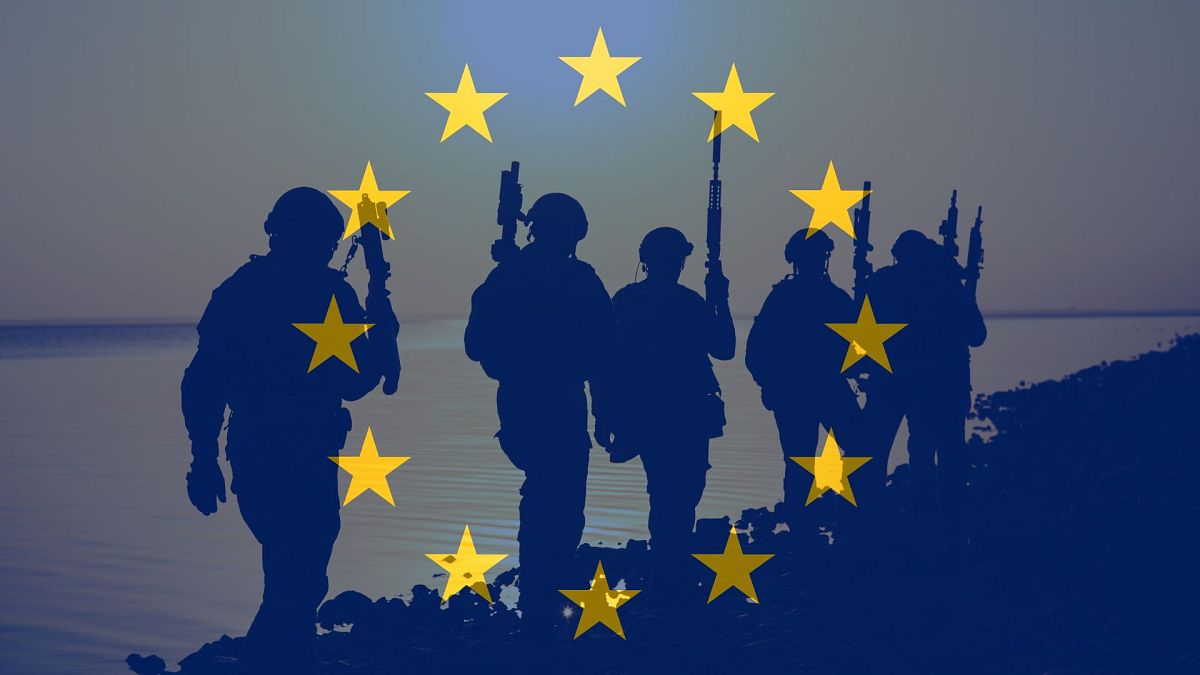Critics of the EU have long claimed that the bloc has created a joint army or soon will, citing calls from pro-European voices who want an ever-closer union. The Cube unpacks the myth.
The idea that the European Union has created or is creating a pan-European army that will conscript citizens from member states is often used to attack the bloc’s leadership and general direction.
It’s typically peddled by right-wing parties and Eurosceptics active on social media to accuse the EU of attacking its members’ sovereignty.
But many proponents of “ever closer union” also invoke the idea, arguing that a European army as a way the continent can better defend itself and reduce its reliance on the US.
One of the best examples of EU army scare stories came during the Brexit debate, when “Leave” supporters whipped up fears of British citizens being drafted into a Europe-wide military force without any having say in the matter.
Is there any truth in this? To put it simply: no, there’s no such thing as an EU army, and nor will there be one in the near future.
“As far as I know, and I consider myself relatively informed, there are no secret plans locked up in offices somewhere in Brussels with this type of plan,” said Professor Daniel Fiott, head of the Defence and Statecraft Programme at the Centre for Security, Diplomacy and Strategy of the Brussels School of Governance.
“So I think you kind of hit the nail on the head with the word ‘myth’ in this context and in this debate,” he told The Cube.
The idea that the EU would set up an army is a particularly emotive issue, hence its susceptibility to false narratives: on the one hand, you have European federalists who yearn for a fully integrated European army, while on the other, you have those who believe it directly contradicts the notion of national independence.
It’s worth pointing out that the idea of an EU army does have some distant foundation in fact, but it’s not the case now.
Fiott noted that after World War II, in the 1950s, there was an attempt to set up a European army, but it failed.
Belgium, West Germany, Luxembourg and the Netherlands all ratified the European Defence Community treaty, which would have set up a supranational army, yet it ultimately fell by the wayside when France and later Italy aborted the process.
Nevertheless, that failed effort obviously fuelled some of the suspicions we see today.
The EU does, of course, have a common security and defence policy, together with a defence agency, but it’s a long way from maintaining an actual army.
According to the bloc itself, the common policy “enables the Union to take a leading role in peacekeeping operations, conflict prevention and in the strengthening of the international security. It is an integral part of the EU’s comprehensive approach towards crisis management, drawing on civilian and military assets.”
Fiott explained that the current arrangement effectively sees individual member states agreeing by treaty to cooperate closely on defence.
“What that really means in practice, and we have lots of cases of that, by the way, is that you can deploy force abroad, whether that be military force or even, in some cases, civilian experts,” he said.
“The principle remains the same: that you have a head of a mission, but that mission is normally made up of individual member states, all collaborating with each other.”
“And that basically means dedicating personnel to certain missions,” Fiott added. “And also deciding on how much money, financial resources or military capabilities should be pooled as part of that effort.”
There are, of course, other European military partnerships and alliances too, most notably NATO.
The majority of the alliance’s member states are also EU members, so rather than integrating their forces under EU mechanisms, further alignment through NATO might be the best way forward for European defence, according to Sven Biscop, professor of strategy and foreign policies at Ghent University, and director of the Europe in the World programme at Egmont, the Royal Institute for International Relations in Brussels.
“It strikes me that after 25 years of near standstill in terms of defence spending, capability development, the idea just seems to be to to carry on without any fundamental overhaul,” he told The Cube. “I don’t think that that makes sense.”
“My view is that we should shift our attention to what member states obviously find most important, and that is NATO,” he said. “So I would say: try to align the contributions of the European allies within NATO so that all European NATO allies together have a complete set of forces.”
Biscop explained that if European countries are lacking in any way militarily, they should be able to use EU instruments and the European defence fund to help European NATO allies build up what they’re missing.
As things stand, the European forces within NATO can only be fully operational with the support of the US, according to Biscop, but that needs to change.
“My ideal instead is that in the end, the Europeans in NATO need but the single American to be effective, the ‘Saceur’: the so-called Supreme Allied Commander Europe, because that’s always an American general,” he said. “With all the other assets, Europeans should be able to provide themselves, and there the EU instruments can help.”

